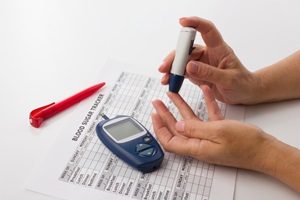 Are you feeling shaky and weak? Nervous and sweating for no apparent reason? It could be hypoglycemia – low blood sugar – a symptom, just like fever, that signals something is wrong with your health.
Are you feeling shaky and weak? Nervous and sweating for no apparent reason? It could be hypoglycemia – low blood sugar – a symptom, just like fever, that signals something is wrong with your health.
When it comes to the early signs of hypoglycemia, and what causes hypoglycemia, diabetics already have an understanding of the condition. They know they have to keep their blood sugar in the healthy range because their body either can’t produce insulin (type 1 diabetes) to handle sugar in the body, or they can’t use insulin effectively – they’re insulin-resistant (type 2 diabetes).
Advertisement
However, hypoglycemia, also commonly called low blood glucose, can happen to people who aren’t diabetic. So it’s important to understand the symptoms of hypoglycemia and if you’re at risk.
But let’s take a look at why your body needs sugar in the first place.
Need for blood sugar control
 When we think sugar, we think the fine crystals of sugar or sugar cubes we put in our coffee, tea or baking. But the sugar our body depends on is glucose from the carbohydrates we consume – the natural sugar in fruits, vegetables, dairy and grains, for example. The cells in the body use sugar from carbohydrates for energy. Glucose is absolutely necessary for survival.
When we think sugar, we think the fine crystals of sugar or sugar cubes we put in our coffee, tea or baking. But the sugar our body depends on is glucose from the carbohydrates we consume – the natural sugar in fruits, vegetables, dairy and grains, for example. The cells in the body use sugar from carbohydrates for energy. Glucose is absolutely necessary for survival.
The body’s insulin, normally made in the pancreas, breaks the sugar down so the cells can take it in and use it. When insulin manages sugar control, it helps keep the levels of sugar in the blood from getting too high. High levels are also problematic.
Levels that are too high can cause severe dehydration and, over time, excess sugar in the body will damage organs such as your eyes, heart and nervous system.
But what about levels that are too low in hypoglycemia? Just as serious, if you ignore the symptoms, you could lose consciousness. This happens because your brain needs glucose to function. Left untreated, hypoglycemia can cause seizures and can be fatal.
You don’t want to let low blood sugar get out of control. Let’s take a look at the early signs of hypoglycemia so you’ll know what to look for and when to seek treatment.
Symptoms of hypoglycemia
 If your glucose levels become too low, it can cause these signs and symptoms of hypoglycemia:
If your glucose levels become too low, it can cause these signs and symptoms of hypoglycemia:
- Sweating, which is almost always present. Check for it on the back of your neck at your hairline.
- Heart palpitations and feeling anxious
- Fatigue
- Pale skin
- Shakiness
- Extreme hunger and slight nausea
- Irritability
- Tingling sensation around the mouth
- Crying out during sleep.
You may experience these symptoms of hypoglycemia when your blood sugar has dropped below 70 milligrams per deciliter (mg/dL). Sometimes, though, if you have had diabetes for many years, you may not always develop these symptoms of mild low blood sugar and you run the risk of a serious drop in blood sugar and possible seizure or loss of consciousness.
What to do? These symptoms should go away shortly after you eat food that contains sugar. It’s good to know which foods offer fast-acting carbohydrates – foods that are easily converted to sugar in the body, such as candy, fruit juice, regular soda (not diet), or glucose tablets or gel. Diabetics are advised to carry a fast-acting carbohydrate with them at all times to be prepared.
Note, though, that foods containing fat or protein aren’t good treatments for hypoglycemia. These foods can slow the body’s absorption of sugar.
When your blood sugar levels return to normal, make sure to have a snack or meal to help stabilize your blood sugar. This will help replenish your glycogen stores that may have been depleted during the hypoglycemia.
Important to note, if your blood sugar continues to drop (below 40 mg/dL), your behavior may change as well. Your symptoms may include the following:
- Slurred speech.
- Confusion
- Unsteadiness when standing or walking
- Inability to concentrate
- Muscle twitching
- Personality changes, such as anger or crying.
If your symptoms are severe, and you can’t take sugar by mouth, you may need an injection of glucagon or intravenous glucose. Seek medical help immediately. Never give food or drink to someone who is unconscious. They could aspirate these substances into the lungs.
Causes of hypoglycemia
 Now that we’ve covered the symptoms of hypoglycemia, let’s look at the causes of hypoglycemia to better understand how to avoid low blood glucose.
Now that we’ve covered the symptoms of hypoglycemia, let’s look at the causes of hypoglycemia to better understand how to avoid low blood glucose.
Hypoglycemia usually happens when you haven’t eaten, so you’re in a fasting state, but not always. Sometimes it occurs after meals because the body produces more insulin than you need.
As we mentioned, diabetics are most familiar with hypoglycemia. They are advised to monitor their blood sugar and keep it in the healthy range. If they’re type 1 diabetic, they’re control has a lot to do with what they’re eating and their level of activity.
If a diabetic, however, takes too much insulin relative to the amount of glucose in the bloodstream, it can cause blood sugar levels to drop too low – one of the common causes of hypoglycemia.
Hypoglycemia can also result when, after taking your diabetes medication, you don’t eat as much as usual or you exercise more than you normally would. You’ve consumed less carbohydrates and then burned more off when exercising. In terms of prevention, a diabetes educator or your doctor will work with you to find the best dosage that fits your regular eating and activity habits.
Advertisement
If you experience repeated episodes of hypoglycemia, this can set you up for “hypoglycemia unawareness.” Your body and brain no longer produce the warning signs and of hypoglycemia. When this happens, the risk of severe, life-threatening hypoglycemia is increased.
In people without diabetes, hypoglycemia is much less common. In these cases, causes of hypoglycemia may include the following, according to the Mayo Clinic:
- Excessive alcohol: Heavy drinking without eating can block your liver from releasing stored glucose into your bloodstream and bring on hypoglycemia.
- Critical illness: Severe illnesses of the liver, like hepatitis, can cause hypoglycemia. Also, disorders of the kidney, where a buildup of medications affects glucose levels. Long-term starvation that may happen with anorexia nervosa, can result in the depletion of substances your body needs in gluconeogenesis, causing hypoglycemia.
- Medication: Taking someone else’s oral diabetes medication accidentally could cause of hypoglycemia. Other medications may cause hypoglycemia, particularly in those with kidney failure.
- Insulin overproduction: A rare tumor of the pancreas – insulinoma – may cause overproduction of insulin which can result in hypoglycemia. Other tumors can also lead to excessive production of insulin-like substances.
- Hormone deficiency: Disorders of the adrenal glands and the pituitary gland can lead to a deficiency of hormones responsible for regulating glucose production.
Causes and symptoms of hypoglycemia need your attention! Determine the underlying cause and go from there. You don’t want to put your health at risk. Consult with your doctor about lifestyle changes and other strategies to avoid hypoglycemia and keep your blood sugar in the healthy range.
